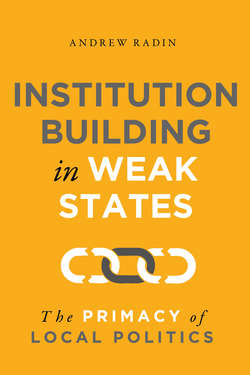Читать книгу Institution Building in Weak States - Andrew Radin - Страница 13
На сайте Литреса книга снята с продажи.
DOMESTIC OPPOSITION THEORY
ОглавлениеForeign reformers are not on home turf. The state institutions they seek to reform are staffed by local officials, overseen by local elites, and accountable to the local population. The domestic opposition theory generalizes about the interaction between foreign reformers and these domestic actors. The theory explains how foreign demands or recommendations can threaten domestic interests, when and how domestic actors may support reform or oppose it in different ways, and how their acceptance or opposition shapes the success of reform. Many issues play a role in the domestic politics of societies experiencing foreign reform, but the theory expects two issues—nationalism and the ruling elites’ patron-client networks—to be especially important in motivating domestic opposition. Chapter 2 offers more details of the domestic opposition theory and its hypotheses.
Nationalism refers to the belief that a particular group should have control of its own state.24 Nationalism is a popular ideology in many societies, especially due to the enduring impact of violent conflict. When foreign demands or recommendations threaten the dominant nationalist goals of a major group in a society, my theory expects reform will fail. For example, in Kosovo after 2001, the United Nations adopted a policy of indefinitely delaying negotiations for independence, but independence was the dominant Albanian nationalist goal. My theory predicts that demands or recommendations threatening nationalist goals lead to widespread and recurring public opposition, as in Kosovo, where riots in 2004 occurred in response to the threat to independence. Public opposition convinces foreign actors that the population does not support their proposed reform. Foreign actors must abandon or adjust their demands, undercutting any improvement in an institution. Public opposition can also delegitimize future international efforts in a society, as occurred in Kosovo. Most foreign reformers recognize the potential for damaging opposition and adjust accordingly. Nevertheless, as in Kosovo or police restructuring in Bosnia, some foreign actors do ultimately propose demands that threaten nationalist goals and provoke large-scale protests. These cases show how the popularity of nationalism thereby ultimately constrains foreign-supported reform.
The second important domestic interest is the ruling elites’ patron-client networks. In many societies, ruling elites use patron-client networks to exercise control, provide resources to supporters, and otherwise maintain their power. Patron-client networks often play an important role in the politics of societies where foreign actors pursue reform due to a history of violent conflict or limited political development. By seeking to improve state institutions, foreign reformers often make demands or recommendations that threaten these networks and thereby challenge the position of the ruling elite, as the book’s opening example of defense reform in Ukraine demonstrates. Because elites’ patron-client networks tend not to be popular, the theory expects that elites usually cannot rally large-scale public support. Instead, they engage in private opposition by using their networks to delay reform, extract resources, or co-opt state institutions. Private opposition is likely to be the most intense in geographic areas or components of an institution where reform poses the greatest threat to ruling elites’ networks. I expect foreign actors with extensive resources to be able to mitigate private opposition by monitoring and sanctioning noncompliance, but foreign reforms facing private opposition are unlikely to achieve dramatic success due to gaps in local knowledge and the necessity of involving local officials in state institutions.
Some reforms may include demands or recommendations that threaten both nationalist goals and the ruling elites’ networks. These reforms are expected to fail, most likely due to public opposition, which is more effective at resisting foreign reform. The most successful reforms are expected to be those where foreign demands or recommendations propose improvements that do not threaten nationalist goals or the ruling elites’ networks. In these cases, some international resources are also necessary to achieve success. For example, in defense reform in Bosnia or the development of central government institutions in Kosovo after 2004, the use of money, advice, and conditionality was essential to build more effective, accountable, and law-abiding institutions.
